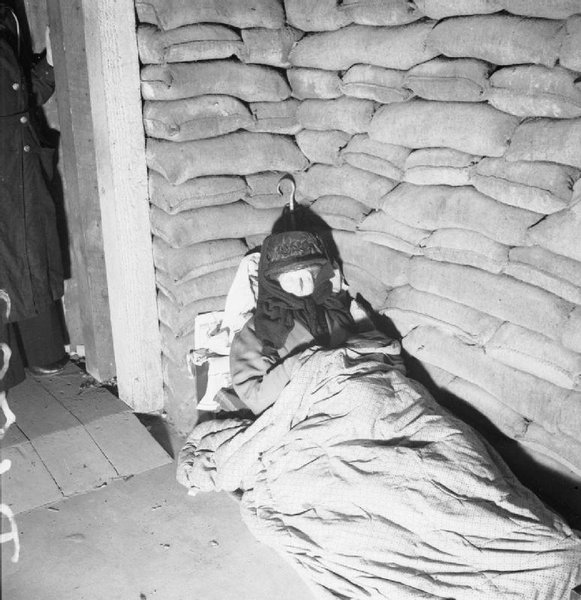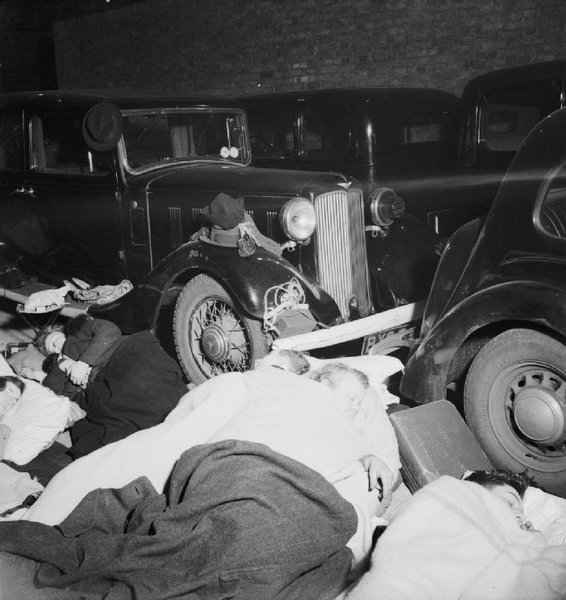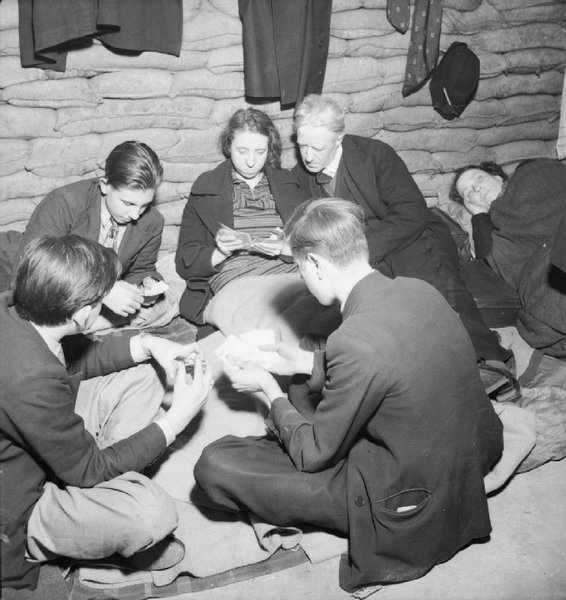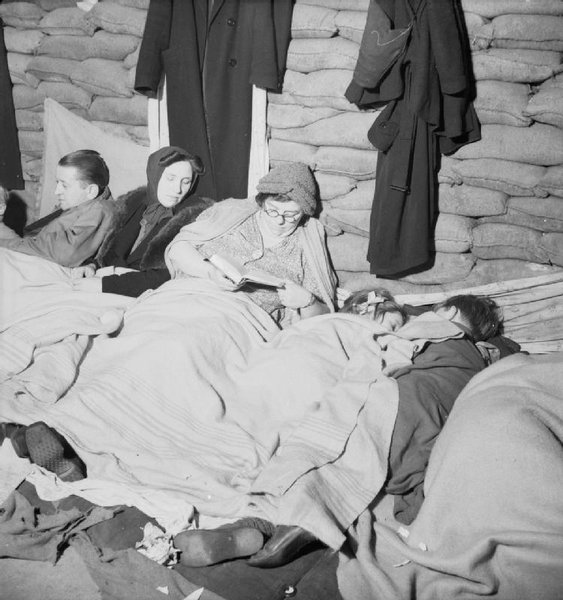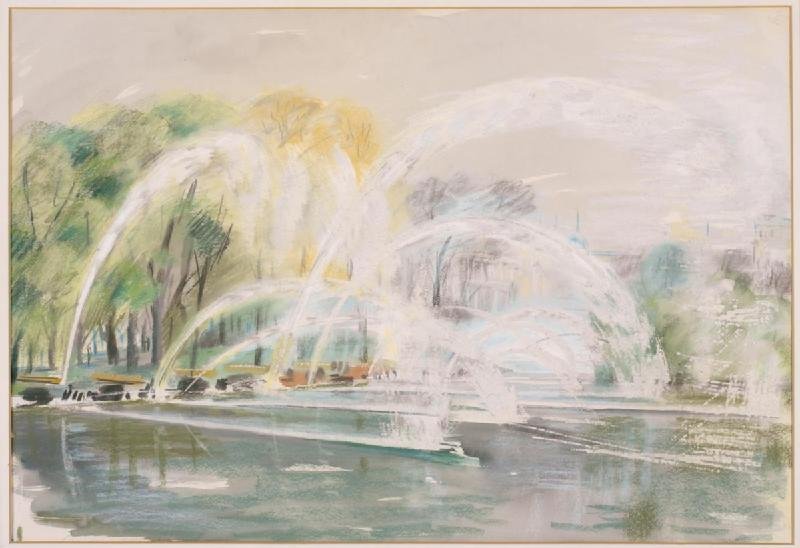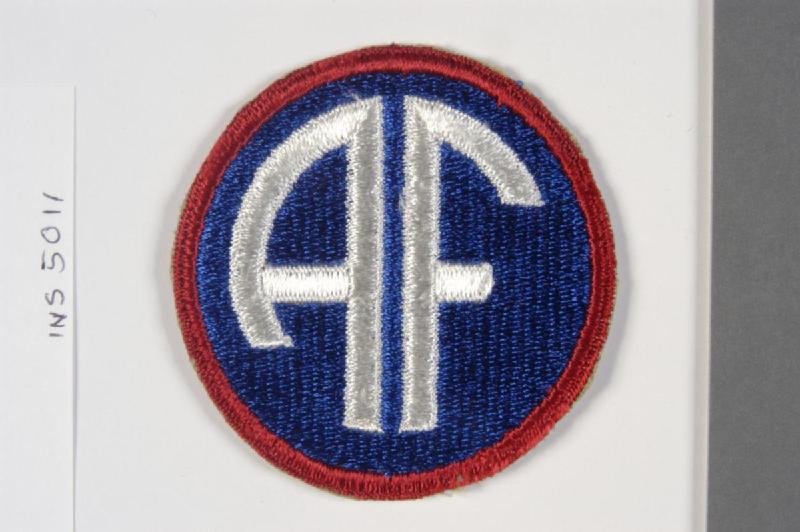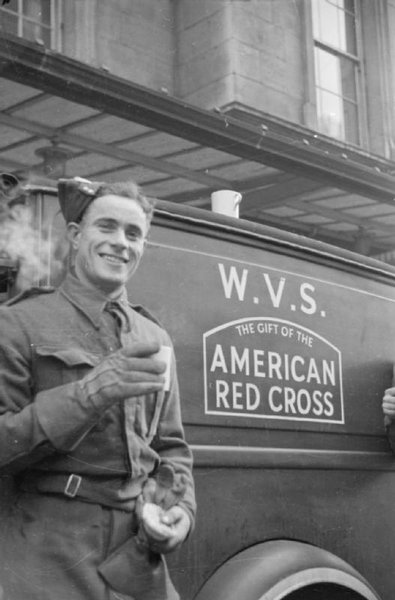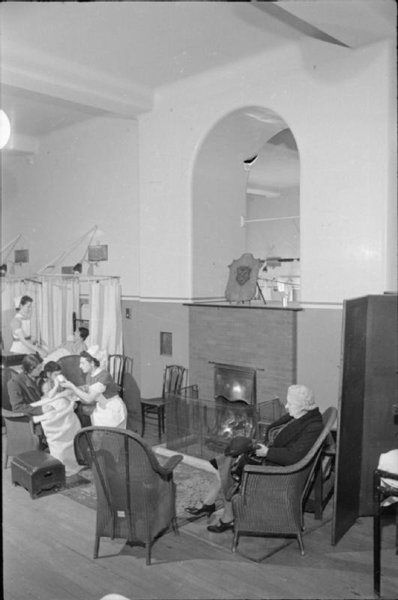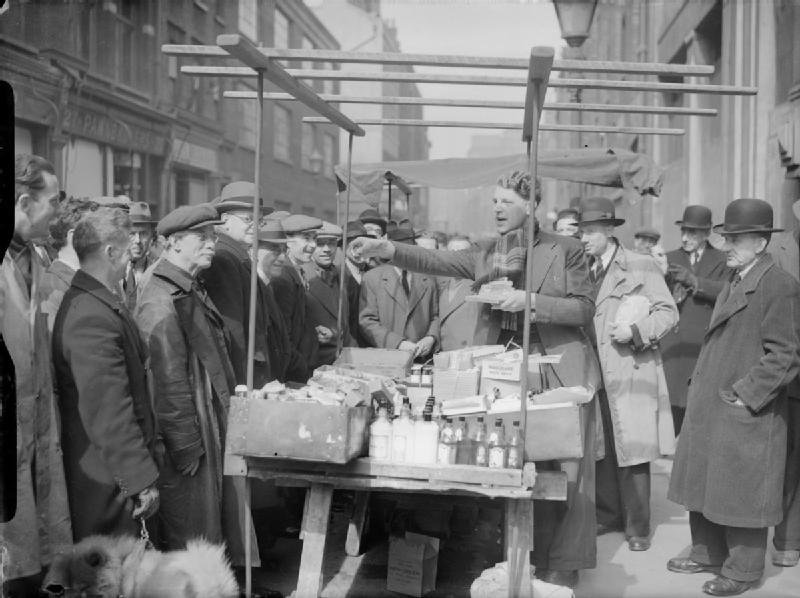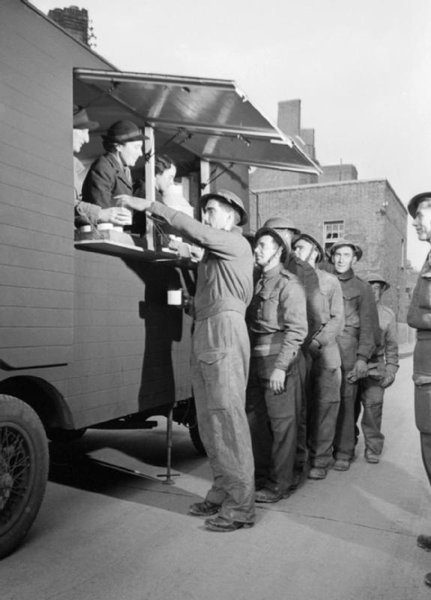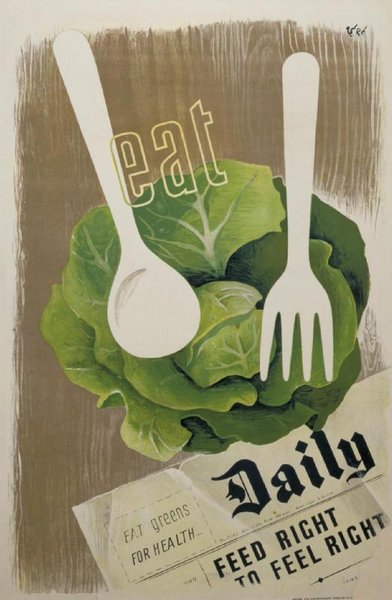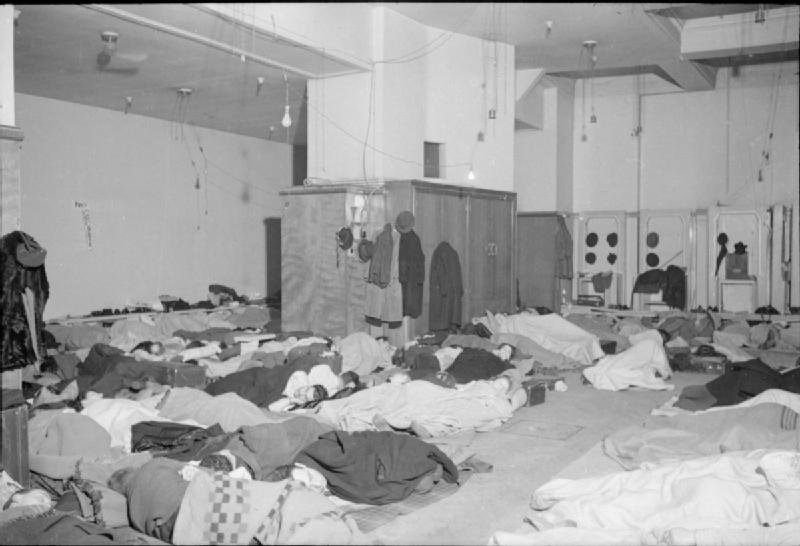High Explosive Bomb at Moreton Place
Description
High Explosive Bomb :
Source: Aggregate Night Time Bomb Census 7th October 1940 to 6 June 1941
Fell between Oct. 7, 1940 and June 6, 1941
Present-day address
Moreton Place, Pimlico, City of Westminster, SW1V 3AT, London
Further details
56 18 NW - comment:
Nearby Memories
Read people's stories relating to this area:
Contributed originally by DOUGLAS ROTHERY (BBC WW2 People's War)
Chapter XI - A Proud Epitaph
Shelling had now become extremely intensive and have been warned to expect a counter attack. A tank to our front was a blazing inferno and was close to a stone built barn, two of my Section requested permission to go to the toilet and they ran to the stone barn, but no sooner had they disappeared inside, it was hit simultaneously by two shells and we couldn't see the barn for a cloud of dust. I was thinking well that's their lot, when out of the dust two figures emerged running like the clappers holding up their trousers, as you can imagine we roared with laughter especially when one them said, 'It was a sure cure for constipation'.
I am not exaggerating when I say that for every minute of the day and night the shelling and salvoes of rockets from the Moaning Minnies were terrifying, one continuous barrage, I have never known such a concentration before on such a comparatively small area. We could hear women and children screaming in terror in the houses to our rear many of which were ablaze, lighting up a moon-less sky. This barrage was still continuing in the morning with the same ferocity, no let up, it was most traumatic and horrifying witnessing this onslaught without any means of personal retaliation but just standing there awaiting the chance perhaps of a reciprocal respite when given the order to advance, these experiences cannot be expressed in words or films. Our exact map location at that very moment I hadn't the slightest idea mainly because Section leaders are not in possession of such, what I did know is that our presence was not at all entente cordial.
Regardless of this slaughter taking place around us, out comes Dad, God bless him, with our mess tins of precious sustenance, dumps it, then scurries back to where he has hidden our vehicle. No sooner had he done so, we sat down on the floor of the trench to partake of our meagre breakfast, leaving Gdsm: Bowse standing on guard and acting waiter. He was in the process of handing me my mess tin by reaching over two others when there was an almighty explosion. I was flung backwards by a terrific force and momentarily stunned. There was a few seconds silence ,then I called on the Mother of God for divine intervention and succour. I eventually could see out of one eye my hearing was naturally impaired, blood was pouring down my face, my arms felt stiff and numb, the front of my tunic was ripped away and both sleeves were in tatters. The poor unfortunate who was leaning over to me, Guardsman Bowse was killed, two others were injured no doubt his body protected us from more serious injuries. I was to learn some time later that a rocket shell had hit the perimeter of the trench so if it had happened a few seconds before we would have been all standing up. Someone put a bandage around my head and eyes and helped me and others into a vehicle which took us to the First aid post about a mile back. They cleaned me up a bit, re-bandaged my head and eyes, put both arms in slings then put me in an ambulance to be taken to the base hospital. No sooner had I laid down in the ambulance than I felt a joy of relief, everything seemed so peaceful, just the rumbling of shell fire in the distance as I gradually unwound from the tension and trauma of hell plus the fact I couldn't remember when I slept last, I was certainly going to make up for it as I went completely out.
Waking up as the cold air hit me, I was carried in on a stretcher into the Base hospital which was a very large marquee somewhere in France. After being put to bed a doctor along with a couple of others gave me a thorough examination and removed the slings from my arms. Apparently my chest arms and face were like a pepper pot caused, according to the doctor, by fragmented stones, these he said would eventually come to the surface and was nothing to worry about and were also in the muscles of my arms causing them to be stiff.
I remained in bed for about 3 weeks whilst they treated my ears and eyes and eventually allowed me to go to the washroom which was the first chance I had of seeing my face and it was a peculiar experience because I didn't recognise myself. Apart from it being peppered it was blown up like a balloon caused by the blast and my eyes were just slits, it was a bit of a shock. They seemed quite concerned about my eyes more so than my ears, which has left me with a steam train passing with its whistle blowing.
Whilst here I felt very proud when other patients on hearing that I was a Grenadier would come over to congratulate me on the achievements of the Guards Armoured Division. ( Div: sign:-- 'The Ever Open Eye'), a sign by looking at me, that must have seemed a contradiction.
This also gave me the opportunity to reflect on the trauma an infantry man uniquely experiences, yet at the end of his stint is not even given any more consideration to those who although not in earshot of enemy action are entitled to the same Campaign recognition which to me makes the medal significance less rewarding. (The powers that be I imagine would say 'You were only doing what was expected of you").. Shame.
After about six weeks I was informed that I along with others were to be flown back to Blighty, I was elated. One morning I along with about ten others, some on stretchers, found ourselves in the corner of a field where there was a lone Dakota, it wasn't long before we were up and away. Flying low over the channel to escape radar detection and on nearing the home coast we climbed, it was a wonderful feeling looking down on a peaceful countryside bathed in sunlight so much so I pointed this out to a fellow on a stretcher whom I expected to share my enthusiasm but he only gave me a scornful look. I then realised he was a Jerry.
We landed somewhere in West Bromwich because it was to a hospital there where I was to stay for a short while, thank goodness! It was very primitive. I was then transferred to a Birmingham hospital where I was eventually allowed out in regulation hospital blue and red tie thus giving me the opportunity to visit an Aunt. I was then transferred to Leamington Spa to the 'Home for the Incurables.' I hasten to add that service personnel were in a separate ward. Each evening a Victorian battle-axe of a matron would literally march through the ward with her entourage, who endeavoured to keep up with her, whilst the patients that were able, had to stand at the foot of their bed until she had passed through, you then had to go to bed. As there were no radio or headphones in the ward we naturally, being interested in the progress of the war sought permission to be allowed to hear the 9pm news in the Rest room, this was refused because it would upset the procedural practice carried on in the hospital for decades. It was decided that it was about time the rules were changed, so come 9pm we would sneak downstairs until one night we were reported. To cut a long story short I was appointed as spokesman and had to appear before the Head Administrator who threatened to report me to the army authorities, I likewise their draconian method of administration. We were granted permission to hear the 9pm news with a promise of headphones for each bed.
After a few months I was sent to Stoke-on-Trent convalescent army camp where after being issued with new clobber I was to meet up with many of my mates now patched up and eager to get back at the enemy. (If you believe that you will believe anything). I was very surprised to meet R.S.M Hufton who had certainly mellowed after his battle inoculation, I didn't know he had been wounded. He called me over and asked me what I was doing that afternoon. I nearly said 'I didn't know you cared'. Anyway he treated me to a football match between Stoke and Portsmouth and afterwards to a Cafe for a tea and a wad. 'There you are, they are human after all'.
After idling our time away here for a few weeks all Grenadiers were sent to Victoria barracks Windsor where I was to meet up with more patched up heroes straining on the leash, but before doing so there was much reminiscing over pints with old acquaintances, one of them being a Sergeant Twelftree who was a pall bearer at the funeral of HM King George V and was one of my buddies when we first went out to France so we had plenty to celebrate about. Unfortunately they were all to rejoin their units with the exception of Corporal Griffiths ex heavy and light heavy weight Brigade boxing champion who, like me was now downgraded to C2 and was to be my Corporal of the guard at the barracks one night. On reveille, Griffiths on dismounting the sentry, (who by the way was a recruit,) marched him into the guardroom and gave him the order to unload and in doing so the recruit inadvertently left a round up the breech and on pressing the trigger the bullet went into the ceiling scattering plaster all around the guardroom much to the amusement of Griff; who was curled up in muffled laughter behind him. The Picket officer a [Young Chicko] walked in immediately afterwards and I thought he had heard the report but apparently hadn't, which I imagined should have woken up all of Windsor, but he was just checking the Tattoo report as part of his duty by asking 'Everything all right Sergeant'. He didn't look anymore than 18yrs old and was at the same time walking around the guardroom tapping the plaster from side to side with his stick. When I explained what had happened he just said 'Oh, oh railly, oh, oh' and off he went. The recruit got off with a reprimand, I believe the shock it gave him was ample punishment.
Whilst here I received a Regimental Christmas and New Year card with the Divisional sign of the Guards Armour (the ever open eye) on the front cover, the card denoted the capture of Nijmegan among other battle honours and it was sent to me by L/Cpl Cox(Nobby) who was one of my Section before he got promoted. I was to learn later that he must have been killed whilst the card was in the post. 'God Bless'.
I was talking to a group of Americans who dressed in their army uniform were waiting at the main gate and had apparently arrived back from France the day before,and I asked them how much they enjoyed the luxurious accommodation of Victoria barracks, I am afraid their response wasn't at all complimentary. They said they were the Glen Miller band and were awaiting their leaders arrival. His disappearance to this day still remains a mystery.
Being downgraded, all that my duties comprised of here were Sergeant-In-Waiting and Sergeant of the barrack guard roles, so R.S.M. Snapper Robinson I should imagine decided that I might have some undiscovered talents which were not forthcoming here because he passed the Buck and me with it to 'Stobbs camp' near Hawick where I was to discover to my amazement, my mate of old standing Dennis Ward of No5 Section who told me that soon after my encounter he was shot receiving a bullet wound in the shoulder and was now pronounced fit enough to be shot at again and therefore was training with a contingent of Grenadiers for Far Eastern engagements.
I don't believe their gastronomic considerations were very high on their priority list because I was sent to H.Q Company to be in charge of their rations where each week I along with a driver in a 15cwt truck would have to proceed to Edinburgh to buy from the N.A.A.F.I. store, an amount determined by the manipulation of an allowance considered enough to sustain about fifty or so hungry warriors. One particular morning I was informed to report for Company Commanders Orders where I was expecting to be formally told that I had been recommended for promotion, unfortunately on meeting the Company Commander, he had just discovered at this late hour, that I was not A.1 and therefore was extremely sorry but it must be denied me. If the reason for not being upgraded was due to unsatisfactory ration distribution or whatever, I might have understood, but the lesson to be learnt is, when you go into battle, Its not only your life that is on the line but also your promotion so for goodness sake keep your head down. My ambition to join the Police when hostilities ceased was also shattered. Regardless of these adversities, I am proud to say my compensatory reward was having been in the company of wonderful comrades who also experienced the honour of being contributors to the historical glory of an equally glorious regiment
Whilst I was here peace was declared in May 1945 so my rationed superior recipients either seeking revenge or the alternatives to prunes and custard each Sunday lunch, decided to transfer my expertise to( Sefton Park) Slough where I was to remain until my demobilisation and in keeping with the usual Service administrative protocol, I was sent to the furthest point in the South of England, 'Penzance' Demobilisation Centre instead of the one close by namely Reading.
On arrival I was to be very disappointed with the few suits available and when I mentioned this they were very apologetic and came out with the old cliche, 'If sir would come back tomorrow when they were expecting a new consignment', Some hope! No homing instincts were to dominate my dress sense and I was to choose one I considered less conspicuous of the few remaining, a blue serge, which I am sure was made from a dyed army 'U' blanket in which I furtively crept away in, with the princely sum of 75 pounds for which I signed for. So after completing 8yrs with the colours because of the war, instead of the 4yrs in which I enlisted, I was to return home on the 2nd of March 1946 at the age of 26 years to the same establishment in which I left to join up.
That said, I reflect with sadness but with tremendous pride the heroic memories of those whose supreme sacrifice along with their past comrades, have contributed so generously and honourably to the proud epitaph of "THE BRITISH GRENADIERS".
2615652 EX L/SGT ROTHERY. D.. Arthur Baker survived the war after serving his time in the 3rd Batt:and we were never to meet up again until approx; 10yrs after joining the army together. He was married and lived in Guilford
Contributed originally by DOUGLAS ROTHERY (BBC WW2 People's War)
Chapter IV - Royal Encounters
In between the 24hr guard duties, other training continued, be it P.T. Weapon training, Education, First aid and of course Ordinary drill and Fatigues etc., every moment of the day was accounted for.
It wasn't many days after my Bank Guard that I noted with pride and panic, my name down on Daily Details for Buckingham Palace Guard. I was conversant with the procedural drill on arrival at the Palace, the changing, the double sentry drill on the pavement outside the railings of the palace whenever their Majesties were in residence etc., but wasn't so sure of the forming up on the square of my particular guard. I knew that I would have to 'Bloody Well Soon Find Out', so I discreetly watched the next Guard mount from a safe distance, (not allowed to stand and stare). But it didn't give me much confidence, because as soon as the order by the Sergeant Major was given,
'GET Ooooooon Parade'!
all that I could see was a mass of scarlet tunics and Bearskins criss- crossing in quick time trying to get to their respective Guards, St James Palace Guard being the senior followed by the Buckingham Palace Guard then the Waiting Guard, which parades in abeyance to replace those deemed as not suitably turned out by the inspecting officers. I rather despondently crept away not looking forward to my initiation and can only hope I don't have to learn by my mistakes.
On the day of my inauguration the Drummer blew the call to warn those who were for guard duty, finishing with a call called "TAPS the words of such known universally throughout the Brigade as "Youve Got A Face Like A Chickens Arse" thus reminding you that you have 20minutes before parade.
One of my chums gave me the once over before I gingerly make my way down the stone stairway trying not to crack the highly polished uppers of my boots, rifle in one hand, kit bag containing cleaning materials etc. suitably labelled for Buck House in the other for it to be taken their by transport. In all of this time, the band has been playing some known and some unknown airs, of which I am in no mood to appreciate. The officers of respective Guards, are patrolling up and down, also the Sergeant Major. Briefly all goes quiet, the next moment pandemonium when the Sergeant Major coming to a halt, bellowed out.
'GET Ooooooon Parade'!
This is it!
My heart misses a beat as I become part of this mass stampede in quick time, also trying to figure out where my guard marker is whilst at the same time trying to protect the precious hours of spit and polish on my size 11's from some other clumsy clots. These problems intermingled with orders being shouted from about half a dozen different W/Officers, I eventually make it.-Phew!- Now steady down.
After the formalities of the dressings, the roll call etc, comes the fixing of bayonets. The right marker marches forward the regulatory paces to give the signals for the fix, another panic sets in 'Thinks' Did I replace the bayonet into its scabbard after giving it its final polish! Its too late to check now. The next moment the order was given (FIX )- Yees"-"Thank Goodness," so far so good. Now for the inspection by the Guard Officer and"his entourage, Company Sergeant Major, Sergeant and Corporal, whatever fault one of them misses the other will pick up, whilst the band plays some lilting music which helps to drown the expletives being afforded to some unfortunate.
We march out to the usual tune on leaving barracks then to a stirring march to which we rightly and so proudly swagger along to, our hearts swelling with pride in the knowledge that we are the envy of the world. Somewhere along the route the guard W/Officer gave the command 'Escort to the colour' and being already briefed on what to do, I double out to the RH side of the road as part of that escort. whereupon on nearing Buckingham Palace we are recalled back into the ranks
.My first Stag [Guard Mount] was outside the front gates of the palace and I felt very proud and privileged yet at the same time extremely apprehensive after a warning from a experienced old sweat not to allow any of the public to stand by your side for photograph sessions as this could find its way not only for publication but also Regimental scrutiny looking for lack of poise or posture etc; also to be alert for the authoritive Regimental spy within passing taxi's, so with this in mind, no sooner had a damsel or anyone else posed themselves by my side for a photo, I would start patrolling [Spoil Sport].
On returning to barracks the next day someone called out that the official photographer was downstairs, so being still in guard uniform I took advantage of this opportunity which I believe cost me 2/6d (12&1/2p) including frame, which my parents were to proudly display.
Back to the varied training, where within a few days I had my first St James Palace Guard, which was fascinating , because the ceremony of the Changing of the Guard is in the courtyard within the palace overlooked by the balcony from which all historical proclamations are made. My patrolling on one of the sentry posts was under an archway, where, over the many years, the tip of the sentries bayonet had cut deep grooves into the stone roof. I bet that could tell a few stories!
My father being an ex soldier of the 4th Queens Own Hussars, gave me the following advice as I was leaving home to join up.
'Never volunteer for anything'.
But when volunteers were requested with the promise of a day off duty if we took part in an experimental inoculation, well, that was too good to miss! Three days later I was allowed out of bed! Never again, the shaking, aching and vomiting, we never found out what it was for but rumour had it that it was an anti malaria experiment. My advice is:
'Never volunteer for anything'.
Went out with the three musketeers, (whom I have already introduced), they
being older serving soldiers were in possession of civilian clothes passes. These could be applied for once you had served 12 months in the battalion, I still had 9months to go, this would then entail buying a suit (I am afraid that my 50/- (2 Pound 50p) one wouldn't pass the required standard on all counts). It must be smart and of a specified design and colour then inspected and approved by the Adjutant, anyway, I wasn't financially embellished at this short period of service to be able spread my limited retainer to cater for such extravagance. After wandering around Hyde Park and Speakers Corner, we decided to quench our thirst in a nearby Public house. The three six footers plus in their civilian clothes and wearing the traditional trilby hats (head gear must be worn), were the first to enter amid a buzz of verbal activity, which immediately ceased until I in uniform went over to join them. It was noticeable that, had there been any nefarious deals taking place, my presence must have assured them that we were not the 'BILL' but just the 'BILL BROWNS.'
I learnt it was common practice on returning to Barracks to bring back a fruit pie for the Guard Commander, this would be discreetly placed near the Tattoo report whilst being marked in, in the hope that this sweetener would be acceptable, especially if you were not quite within the second of the three essential conditions, namely (1) clean (2) sober and (3) properly dressed in uniform- alternately civilian clothes.
Professional jealousy would surface mostly between the Senior Warrant Officers of either Coldstream or Grenadiers regarding Regimental history, if the opportunity should arise. Such came the opportunity, when both battalions happened to be drilling at the same time on their respective halves of the square. R.S.M. Brittian of the Coldstream, (reputed at that time to have the loudest voice in the British army) bellowed out to his men (not as a compliment I may add) that they were drilling like a squad of Grenadiers. This was responded to with equal uncomplimentary fervour from R.S.M. Sheather of the Grenadiers. Apart from this light-hearted bantering, it never showed itself in any other way.
Other than our usual drill or musketry training, a few hours each week were spent on Stretcher Bearing (SB) courses, and the order of dress for this parade was Khaki Service dress and not Canvas Fatigue. On this particular occasion we were informed in the usual manner, i.e. Daily Details, that S.B's would parade at a certain time. After forming up on parade, the unfortunate Sergeant reprimanded us for not being in Canvas Fatigue. It was explained to him that Service dress was the usual uniform for Stretcher Bearers, whereas he had interpreted the S.B. as 'Spud Bashing' [ Potatoe Peeling] a well known term by all, especially the miscreants. (I might add that he wasn't allowed to live that down very easily among his fellow compatriots for quite some time)!
Guard duties were on average two per week, so I was now pretty conversant with the procedures, also the many different sentries orders for each of the various guard posts around the Palaces. One such order, among the many, at the front of Buckingham Palace was to keep prostitutes away from the railings, a task the Police on the gates, knowing the ones that come to ploy their trade, would soon sort out, also the onlookers obstructing your beat whereby a sharp tap on the ankles from a size 11 was the same interpretation in any language!
I was now entitled to a well earned rest, which was granted in the form of 10 days furlough where on arrival home after the customary greetings, the next question invariably would be, 'When do you go back'? This was the last thing you wish to be reminded of.
When it was time to return, I fortunately met another Grenadier Guardsman from my battalion at the railway station, who, although from a different Company we knew each other by sight. He spoke in an educated Oxford accent, smartly dressed in civilian clothes, bowler hat, brigade tie and carried a neatly rolled umbrella. On entering the carriage he rang the service bell and ordered a couple of whiskies which helped to dispel the gloom of departure. He then told me that he had already received 7 days C.B. for impersonating an officer. Apparently he, in his mode of dress, on returning one evening to Barracks was saluted by the sentry believing him to be an officer, and he in response acknowledged it by raising his hat (the normal response from an officer). This didn't go unnoticed by the Sergeant of the Guard, who didn't approve, neither did the Commanding officer. When we were nearing the barrack gate on return, he put the umbrella down his trouser leg and walked into the guardroom with a limp claiming that he had hurt himself whilst on leave, his explanation was accepted. Eventually he was to take up a commission in another Regiment and was subsequently killed in action. (Never volunteer etc. etc.)
Each Friday you could guarantee to having two boiled eggs for tea a ritual carried forward from my Depot days and no doubt from many years before. On this particular Friday, the eggs were unduly hard and black on being shelled, this therefore didn't satisfy most of the recipients who began to vent their anger by letting fly with eggs 'Properly Fired'. Before I had time to take cover the door suddenly opened and the Picquet officer plus escort marched in, thus restoring order. The men on being asked in the usual manner, ' Eeney Compleents'? several dared to respond. The Officer with the Master cook now in attendance seemed to agree there was reason to complain whereby no disciplinary action took place. Hereafter eggs were to be boiled on the day of consumption - only joking!. It was also the custom of having Prunes and Custard for Sunday's luncheon Sweet thus ensuring Regimental regularity!.
Now classed as an old soldier on double sentry duties, meant that I would be responsible for giving my sentry partner the regulatory signals for saluting and patrolling when called for on Palace guards etc. On one such occasion outside Buckingham Palace, at approx. 5am, therefore very light traffic and few pedestrians and no Police on the gates, along came a troop of 'Westminster Cowboys', these were Westminster refuse collectors, so called because they wore wide brimmed hats with the side brim turned up. They were no doubt reporting for work and as they drew level on their horse drawn carts, I signalled to my partner, with the regulatory three taps on the pavement with the butt of my rifle and we gave them the 'Present Arms', you should have seen their faces as they looked about in anticipation of seeing a member of the Royal family entering, you had to be very careful though, you never knew who might be watching.
Most complaints came from old retired officers who would walk past in civilian clothes for the sole purpose of getting a salute, so any civilian wearing a dark suit, bowler hat and carrying a neatly rolled umbrella, you took no chances and would salute giving them the benefit of the doubt. On another occasion a Troop of Household Cavalry were passing by on their way to Horse Guards Parade and I naturally Presented arms, they in response gave the customary eyes right and sounded the Royal salute on the trumpet, I was waiting for the officer to give the eyes front, he in turn was waiting for me to come down from the Present, eventually, as they got further and further away, I thought I had better do something, even if it meant waving goodbye, so I came down from the Present and he then gave eyes front, plus no doubt a few other chosen words, he being in the right. I was expecting to hear a complaint about this on returning to the Guardroom but it was not reported, misdemeanours committed on public duties warranted double punishment.
Later in the week one of my postings was at the rear of the Palace and before doing so the W/O of the guard, stated, 'He didn't want reports of 18ft guardsmen patrolling along by the perimeter wall'. Apparently this phenomenon was reported by a civilian in the street outside about a previous guard, where it was surmised a Guardsman had placed his Bearskin onto his bayonet on the end of his rifle and paraded it along the top of the wall.
For posterity I had better relate a rather amusing incident of Royal character whilst I was on that sentry. My post was near the stone steps leading down to the lawn. I heard children laughing and chasing each other, whence one of them a young girl of about 7 or 8yrs of age ran down the steps onto the gravel path of my beat. On recognising her to be Princess Margaret I Presented arms, she ran back up the steps to her sister giggling, no doubt bemused by the reception, repeated the performance.
whereupon I again Presented arms. I assumed she was about to do it again when I heard a male voice, whom I imagined was a member of the staff , usher them inside.
I heard of a not so Royal incident which occurred on Buck; Guard by a Guardsman Cosbab from our No2 Coy. Apparently during a very humid night, he had left his post and was discovered by the night patrol cooling off his feet in the water of the Victoria Memorial opposite, knowing him and his previous antics, I quite believe it. Although very likeable he was a proper Jekyll & Hyde character with a unpredictable devil may care attitude.
The lining of the street was part of our itinerary, which took place for the reception of His Majesty the King of the Belgians, Prince Michael of Romania, the openings of Parliament etc. etc. On one of these occasions because of the inclement weather, order was given to don capes. It was then revealed how the old sweats managed to square up their capes so precisely, when parts of cigarette packets etc. fluttered suspiciously to the ground. Another wheeze I was to learn was that the back tunic buttons were a tourist souvenir attraction, so it was wise not only to sew them on, but to thread a tape through the back of the buttons to help prevent this activity.
Contributed originally by BBC LONDON CSV ACTION DESK (BBC WW2 People's War)
"I'm a cockney born in Kingsbury Road near the Ball's Pond Road in the East End in 1937, so I was like 4, 5 and 6 when all this happened. I went to a Catholic School and during the Blitz when the air-raid sirens went, we'd get under the table and our teacher would say 'now you've got to pray' so we all prayed until the all-clear went.
One morning at 3, my mum's sister cam in and said 'there's a big bomb dropped near the old lady's house - that's what we called my gran - but she said she's all right. We rushed down the road and saw that a bomb had dropped on a school. I'll never forget, there wasn't a window left in none of the houses around. We went into a schoolhouse, the door was wide open, and there was blind man upstairs which they got our early; the whole ceiling had come down on him. We went into the kitchen and there was only about three bits of plaster left. The plaster round the rose on the ceiling was about the only bit left. I asked the blind man if he was okay and he said 'yeah' so I made him a cup of tea. We was lucky because if that bomb had dropped at three o'clock in the afternoon it would have killed all the kids.
I'll never forget this, the front door swung open and a fireman stood there. He said 'Everyone all right?' and one of the women said, well, I can't say what she said, but to the effect of 'that xxxxx Hitler can't kill me!'
We lived off the Ridley Road at the time and during one of the air raids one night, everyone went down the shelters and my dad said to me "Want to watch the airplanes?' My mum said 'That's not a good idea', anyway, he put me on his shoulders and we stood in the doorway and watched the dog-fights overhead. And I tell you, when them German planes got caught in the headlights, they had a hell of a job to get out. Anyway, the morning after these raids, all us kids'd go out collecting shrapnel from the shells, I had a great big box of the stuff.
Was I scared? Only when I was in bed at night and the air-raid warning went. When you're asleep and you suddenly woke, you didn’t' know what was happening so it was pretty frightening. At that age, you didn't know what air raids were all about. Some of the time I slept in the cupboard under the stairs and it felt a bit safer there.
One day, I went round to the corner to my aunt's house and she was sitting by the window when there was an air-raid warning. Inside the window where she was sitting was a table with a statue on it. They told her to come in away from the window. I'll never forget this, there was a bomb blast, the window come in and the statue toppled off the table and onto the floor. If she hadn't have moved, she'd have been covered with flying glass.
My dad didn't go in the army, because he was wanted on the railways. He took me down the dog racing one day at Hackney Wick. This flying bomb - a doodle-bug it was - suddenly appeared over us. You could see every detail of it. We all ran. It went right across the track and dropped in a field somewhere.
One day a landmine dropped near us in Kingsbury Road and didn't go off. A fellow came down from the Bomb Disposal unit, to try to disconnect it and he got killed. Opposite us there was a block of flats and they named it after him - Ketteridge Court.
I was evacuated for a little time, to Kettering, but I don't remember much about it, only that I didn't like it. I'd have to ask my mum about it. She's 100 but still remembers everything.
Me and my family are Pearly Kings and Queens and we do a lot of charity work, entertaining with music and the old cockney songs and that (Phone 020 8556 5971). We are now the biggest 'Pearly' family, made up mostly of the Hitchins (my mum's family name) in Hoxton, Tower Hamlets, Hackney, Clapton, Shoredich, Hommerton, Dalston, City of London, Westminster, Victoria, Islington and Stoke Newington. "
Contributed originally by hugh_sexey_school (BBC WW2 People's War)
Our thanks go to the pupils of Hugh Sexey School in Blackford, Somerset, who collected and prepared these stories with the help of local war veterans. The authors are credited at the end of each story.
Mrs J Gamlin’s War Story
On May 11th 1940 a bomb landed in Mrs Gamlin’s road, Killing a girl and her father. Mrs Gamlin’s father was a special constable and had to go and deal with the deaths and the bomb. Next day Mrs Gamlin was evacuated to the Quantocks. It was ten years before she was allowed to go back home. When she got back she saw that most of the buildings had been bombed or destroyed.
Lots of young children were evacuated to the countryside because of V1 and V2 bombs being dropped. Mrs Gamlin made lots of new friends her best friend was called Patsy. During her stay at the Quantocks she had to grow up very quickly.
Later she was moved to Devon where she met up with her mum and younger brother. Her dad then joined the army and was sent to India. For her the saddest thing was hearing that people she was close to were dead. At the end of the war she became a red-cross nurse.
If Mrs Gamlin had the opportunity to go through the experience again she would because it helped her to grow up properly.
By Thomas Haggerty, Jamie Fitzpatrick and Sophie Watkins.
My World War II
Story
Mr M. Manners was 12-16 years old when the war started. The Germans had made their way into France and were firing V2 rockets over the Atlantic Ocean to England. These rockets where A.Hitler’s secret weapon. They flew over 200miles and 50miles into the air at 3x the speed of sound and came down at 4x the speed of sound so when it came down no one could here it.
Mr Manners was eating his breakfast in the morning when a bomb (V2 rocket) blew up down his street, and his house exploded. Mr Manners was lying unconscious in an armchair. When he woke up he found is aunt dead and his mum severely injured and died a few days later. He found out a few minutes later he had bit of shrapnel in and all over his body. Wooden beams holding up the house had fallen all around trapping his aunt. Mr Manners was rushed to hospital later the same day. After that he went to live with a relative on a farm in the countryside.
By Ja’mahl McMurran, Rosie Shepard and Laura Wilment.
The Memories of Mrs Searle, an Evacuee
Mrs Searle’s memory consists of, how she felt, what she did and the friendships she made during the war. She was age 12 when the war started and age 17 when the war finished.
As a young girl, age 12 at a London train station, Mrs Searle boarded the train and felt as if she was going on the journey to oblivion. She looked back one last time at her family and then sank back into her seat. She felt bewildered and with her luggage label like luggage being packaged off, to an unknown place. But then she looked out of the window and saw the countryside fly passed her and she knew she would never see anything like this again. The rest of the journey went by like a lightning flash as she talked to her friends from her school.
When she arrived she thought that all the people there would be thick and dirty, but she soon found out that she was wrong. As she sat in the chair waiting for somebody to take her home, she felt the worst feeling she would ever have in her life, and she remembered her family and realised that she taken them all for granted. Then finally two women came and took her to a new home.
Her new life meant that she had to go to a new school, meet new people and make new friends, which was a lot easier than she thought. The first time she was evacuated only lasted six weeks, as everybody in Sussex was calling the war phoney, because all the action was happening in France, so she went back to London. The journey back to London felt a lot slower than the journey from London
As the first time she new everybody from her school, but this time she only new one or two people. She’d phoned her mum from her billet so when she arrived she saw her mum straight away and went home.
A couple of months after she’d arrived back home, Mrs Searle now at the age of 13 was playing in the garden with her sister, when she heard a noise, it sounded like an engine, but then it stopped. She had heard rumours that when you heard this noise it meant that there was a bomb coming. Luckily the bomb landed around ten streets away from her house. So the next thing she knew she was transported back to Sussex.
When she stepped off the train she saw her hosts immediately, so she went home with them. Her best friend, who funnily enough was a teacher, made her stay in Sussex a lot easier whose name was Gladys Traunter. She was kind to the evacuees as though they were her own children. Mrs Searle (age 13) had always counted on her family for help, but in Sussex she went to Miss Traunter for advice or help. Mrs Searle always wanted to find out more about where she lived in Sussex.
Some of the friends Mrs Searle made during the war where lifelong, like Gladys Traunter who only died last year (2003). Mrs Searle now in her early 70’s reckons that her life wouldn’t so interesting or stimulating without the war and is glad she was part of it.
Mr. J. Morris’s War Story.
Mr. J. Morris lived in Slough in Buckinghamshire. He was born in 1926 and was 13 years old when World War 2 started. Because of this his school was moved and was shared with a girls school; but the boys went to school in the morning and the girls went in the afternoon. The only friends he made were at school because he only went out for a bit and when he did he didn’t go very far.
His farther worked at the Bristol Railway Station and his mother worked in an ammunition factory. At night it was the worst time because; one, he had to be back before dark; two, he had to go down to the air raid shelter every night and; three, always getting disturbed sleep. At this hard time policeman who lived next door helped him the most.
Where Mr. Morris lived it wasn’t badly affected, but he wishes he could have done more to help. For a week Mr. Morris would get 50g of butter, 100g of margarine and lard, 200g of sugar, 50g of tealeaves, 1 egg, 100g of bacon with the rind still on it, and all this was just for one person. In those times there was no fast food whatsoever and there were no restaurants. But on the good side they got 100g of sweets.
But now he runs a happy social life and is happily married. He still keeps things to remind him of that time but says it is time to move on plus if he could go through it again then he would say no!
By Jessica Bull and Jacob Puddy.
World War 2 Story
Terry Sheppard’s Story
Terry Sheppard was only 4 when the war started and is now 69. His father left his mother before he was born. During the war Terry lived near the middle of Bristol. Terry was not old enough to understand that the war was dangerous and thought it was just an exciting adventure.
He lived in a house with his mother, his aunt and his grandmother. Because of the food shortage not only did they grow food in their gardens they also turned the parks into vegetable plots. Even though he lived in the middle of Bristol he was never evacuated. To get distracted from all of the bombing Terry would read or go to sleep. In his spare time he would swap shrapnel or build dens in bombed out houses.
One day when he was play in a bombed theatre he was running up a corridor and swung open a door. The next thing he knew he was swinging out in mid-air 25ft above the ground with nothing around him but thin air. Luckily a friend was there to pull him up.
One night when the air raid siren went off he rushed to the bomb shelter. Once there, the bombs started to hail down. The bombing was really bad so he slowly opened the door ran to the next closest shelter, the bombing was just as bad there. He then ran to try and get to the next shelter but when they arrived there there was a mass of fire around it. Once he was in and sitting down calmly his cousin’s came rushing in with blood all over them, because their house was bombed. He can still remember the smell of burning and the sound of sirens.
During the war his mother made friends with an Italian prisoner of war who would sometimes come round for a cup of tea. The hardest part of the war for Terry was understanding his mother and other adult’s feelings.
One day when Terry was walking down the street with his friends, when a German fighter plane came down low and started to fire at them. For fun Terry and his friends weaved in and out of the shop doors. Terry collected bomb fins and American Badges.
On his first holiday after the war had finished he saw English soldier’s coming back on the train. One of them gave him some gifts, they included a Japanese officer’s hat, some Japanese money and some Russian money.
By Sam Jones, Jessica Boobyer and Marisha Huxtable.
From Mrs M.Macarthur
Mrs Macarthur lived in North London. She was born in 1938 at the beginning of the war.
One of her first memories was when she was very small, her father wrapped her up in a blanket and took her in their air raid shelter where she can remember looking up and seeing the crossed lights and the Germans’ planes.
Her family grew fruit in the garden and her mother made homemade jam. She also kept rabbits and often had rabbit stew. She remembers that the Government decided to give everyone orange juice so they received enough vitamin C. They used parachute materials for clothes and in her family it was the children who got all of the new clothes because they were still growing up.
When the war started, like most families, they used to listen to the radio and she can still remember Winston Churchill’s voice. One of the jobs she had to do during the war was picking up the droppings of the horses on the horse and carts from the rag and bone man, the Milkman etc…
Even though she lived in London her mother wouldn’t let her and her sister be evacuated. She thinks that she got closer to her family, because it made her realise how much they cared about her.
On a train an American soldier offered her and the other children chewing gum.
She was five when the war ended and her parents took her to the centre of London to see Buckingham Palace. There were a lot of brightly coloured ribbons hanging from the buildings, she thought it was great. In her street there was a huge party to celebrate their victory.
Her father saw the first atomic bomb. Her uncle was conscripted aged 40 to the Navy sending Morse Code, when he came back he gave her a paper bag containing a banana which she had never saw before.
If she had the choice she would defiantly not go through World War II again.
By Maddy Rigby and Harry Hole
I 1939 world War II broke out, and Mrs J. Morris rationing was the main event Some foods were rationed and people had a certain amount of food each week.
Mrs Morris was two when the war started and she lived in Ealing, Middlesex. Her dad was called up early in the war. Her mum was working early in the morning til late at night, so she had to get all the rations herself.
50g of tea was issued per person every week. The same was issued for butter. 100g was given for margarine and lard, also cheese. 200g of sugar was issued per person every week. One egg was given every week, and when the war got very bad, it was one egg per fortnight. As for meat, it was one shilling and one tupence, and two pennys of it was corned beef. Bread was not rationed until 1943/1944. Instead of rationing there was a points system, the points system was like was like another form of money. With points you could buy beans, spam, jam, salmon, cornflakes, shredded wheat, sweets and biscuits.
Clothing was rationed two years into the war. Rationing went on for a long time after the war. Rationing ended in 1954 the year Mrs Morris got married. Radio broadcasts sent out food news, plus recipes. Very few people knew what a banana or a lemon was, and oranges were a luxury along with spam. In the war Mrs Morris’s favourite food was cheese.
Medicines weren’t rationed, neither were cigarettes or beer or spirits, but they were sold “Under the counter”.
Mrs Morris’s registration number was BCC249/2.
By Alex Blake and Hannah Close
Mr J Smith was born in April 1937 and was 3 years old when the War started and 9 years old when the War finished. He was not evacuated. He lived in Filton, Bristol, very close to the aeroplane factory, in which his dad worked. It was also a sweet spot for the Gerries to bomb.
Jeff’s main memory from the War in 1940 was when he was about 3 half and had just heard a loud noise he knew that the German planes had diesel engines and that they were loud, but it was much louder than a diesel engine. So he looked out of the blackened window and saw a huge barrage balloon on fire.
A barrage balloon is like a sort of blimp; t hat was about a 1000 feat high, it was tethered to the ground, with a weight on wheels and a very strong wire.
Woman used to control the balloon and the balloons used to make the German planes, go up over them so it was harder to bomb the factory. Mr J Smith said, “The Women were running as fast as cheetahs.” He found it hilarious but the Women did not.
Mr Smith told us that in the War they had points if the shot an enemy aircraft down.
A barrage balloon was worth a third of a point,
An enemy plane was worth 1 whole point.
Interviewing Mr Jeff Smith
Interviewed by James Hall and Jacob Slade
Mrs J Gamlin
On May 11th 1941 a bomb landed in Mrs Gamlin’s road, killing a girl and her father. Mrs Gamlin’s father was a special constable and had to go and deal with the bomb and the deaths. Next day Mrs Gamlin was evacuated to the Quantocks. It was six years before the bombing stopped and she was allowed to go back home. When she got back home she saw that most of the buildings had been bombed and destroyed.
Lots of young children were evacuated to the countryside because of V1 and V2 bombs being dropped. Mrs Gamlin made lots of new friends whilst she was at the Quantocks. Her best friend was called Patsy. Later she was moved to Devon where she met up with her mother and her little brother. Her dad then joined the army
We are interviewing Mr Tom Flack aged 90.
Mr Flack was twenty-five years old when world II started. Mr Flack found it hard travelling for 7 weeks on a troop ship and staying away from his family.
During the war he drove trucks to Chittagong to be repaired. They flew without parachute then put them on rafts. The Ghurkhas and the Indian army helped the English.Mr Flack joined an army which was called the Lost army at the age of 26.
He got Malaria from mosquito bites, He got it 3 times.
He drank rice wine to cure it.
In the Jungle they took guard of the vehicles because there were jackals, and sometimes they used to find them sleeping in the trucks. Mr Flack owned a Ghurkha knife .You had to cut off a goat’s head with one swipe to have permission to use it.
The knives handle made out of human bone. Men dressed up as woman for fun, because they missed their wives and their families so much.
Mr Flack owned 5 medals and miniature photos and had a long sword hidden in a walking stick, which he took from a Japanese truck.
Mr Flack had lived in bamboo huts that were blown down by typhoons.
He was also arrested for one night because they thought he was a German balloonist.
One of his friends brought a monkey with him which he treasured a lot
If Mr Flack had a choice he would not go through it again.
By Liam Wookey, Stacey Pope and Charlotte Weight
Contributed originally by epsomandewelllhc (BBC WW2 People's War)
The author of this story has understood the rules and regulations of the site and has agreed that his story can be entered on the People's War web site.
A FLYER'S STORY
When war broke out I was working for the Phoenix Assurance Co in the City. I decided to volunteer for the Air Force - to avoid going into the army!!
In May 1940, I was summoned to Cardington to be attested. This consisted of having interviews and a thorough medical examination; and then swearing an Oath of Allegiance to King George VI, his heirs and successors. Finally I was given the rank of Aircraftsman 2nd Class and a number 1161718. Some weeks later I had to give my name and number to a Corporal who said “that’s not a number, it’s the population of China! As far as rank was concerned, I had eight during my six years with the RAF, ending up as a Flight Lieutenant.
In September 1940, I was sent to the Elementary Flying Training School (EFTS) at Hatfield, learning on Tiger Moths. While I was there, an incident occurred which still sticks in my memory. One particular day in October, was a day of low cloud and strong winds and all the Tiger Moths were grounded. All the members of the course were therefore given extra lectures/ Suddenly during a lecture, there was the sound of a low flying aircraft flying across the airfield. One young cadet, looking out of the window said “That’s a Junkers 88” There were cries of derision and some said “It’s a Blenheim” Almost immediately the air raid siren sounded and we all dashed for the shelters. Before we could reach them, the Junkers 88 returned, flew across the airfield, was hit by flak, but dropped four bombs on the de Haviland factory at the far end, causing several casualties and great damage. Many years later, I learned that the new super aircraft, the Mosquito was being built there. I have reflected since, that the crew of the Junkers 88 were brilliant navigators or very, very lucky.
When being trained by Flying Officer Kelsey at Hatfield, he often used to ask pupils to practice a forced landing in a field as if your engine had failed. He did this with me twice, but we found he had an ulterior motive: when we had landed in the field, he jumped out of the Tiger Moth and said `follow me'. I taxied the aircraft round the field to take off again and he would be walking along picking mushrooms. He was very fond of mushrooms and took them back to the mess for his breakfast!!
One of the rather sad things was that at the beginning of every course, which included about 50 men, they always took a picture of all the pupils and that was partly because it was recognized that some would not survive. If you went into a training establishment after the war had started, you would always find some of those in the pictures with little haloes drawn over them - they were the ones who had died. There would be up to about five in the 50 who wouldn't make it. I can't really remember a group photograph where no one had been killed.
I was at Hatfield for about 6 weeks and then went to Hulavington, Wilts. where I was flying Hawker Harts and got my wings.
I finished my training at Sutton Bridge on Hurricanes. I found Hurricanes very difficult to start with. The others were biplanes and this was a monoplane and flew at least twice as fast. The feel of it was very different and seemed to me to be going terribly fast, but when I got used to it, I did like the aircraft. On the other hand, it was somewhat more unstable than the Spitfire and required much more active hands-on flying, whilst a Spitfire when trimmed properly was much easier to handle and in good weather would almost fly itself.
For the next 6 months after training, I went to a fighter squadron in Orkney, where it was very bleak and the wind never stopped. The fighters were there firstly because of Scapa Flow and secondly to try to stop the Germans flying out into the Atlantic. They had big aircraft called Condors as well as Junkers 88s. There is a gap of about 100 miles between Orkney and Shetland which needed covering. The Germans didn't want to go right up to the north by Iceland. There were two fighter squadrons stationed up there, one on Orkney and the other was split between the Scottish mainland and Shetland, to cover these two jobs.
Was I afraid? Not usually. It is true to say that your training gives you confidence which carries you along quite a bit but there is also a feeling that it will always `happen to the other fellow' and you don't think about injury or death happening to yourself, except if you are actually in the middle of a very nasty situation. It something you just get used to.
My next job was as an instructor for almost a year at an Operational Training Unit to teach on Hurricanes and Spitfires. All the pupils already had their wings. The thing is, a Hurricane is a one-seater so you couldn't sit in with a pilot, but there was a Miles Master which was similar to the Hurricane but was a two-seater. The Instructor sat in the back and the pupil was in the front and the most important things to learn were taking off and landing. When you thought they could manage, you sent them up on a solo in a Hurricane with fingers crossed and hoped they could do it.
After leaving the OTU I did some Army co-operation work and some aircraft delivery.
I then transferred to 1697 flight at Northolt in July 1944. This was called Air Despatch Letter Service. We had Hurricanes specially adapted to carry mail. They had a special space behind the pilot and it was also possible to use one of the under--wing fuel spaces for mail. The object of this was to fly despatches from Normandy back to London. We used to fly the Hurricanes in to the airstrips and despatch riders would come from the front bringing despatches for London. It took about an hour to fly the distance back to Northolt where another despatch rider or driver would take it straight in to London, so an action which might have taken place at 7 a.m. would be reported in London by about 10 a.m. This practice gradually spread a11 over Europe as the armies advanced. We advanced with them, flying to the nearest airstrip and collecting despatches for home.
On 26 August 1944, I flew information from Balleray in France to Northolt all about De Gaulle's entry into Paris and it was very interesting to see it in the papers the next day, knowing that I had carried it in.
VE Day was very busy and I made three flights on 8 May, flying from Germany to Holland and Holland to Northolt and then back to Germany. During the post-war period we were even busier than before with mail and information, clocking up a lot of flying hours. It was during this time that I was able to have a little flight on a Focke Wulf 190 which we had captured. It was very interesting but was extremely fast and it was a little unnerving in a way because there was so much electrical equipment. Instead of levers many of the controls were just little buttons so you controlled it very tentatively hoping it would do the right thing.
My last flight as a member of the Royal Air Force was in a Spitfire on 5 April 1946 but in 1953 I did some flying at Redhiil as Air Force Reserve, because I have to admit, I missed flying. However, I finally stopped flying in May 1953 and have not flown since. I totaled up 1527 hours of which I would think half was in Hurricanes.
I didn't find running the mail dull. I enjoyed pilot navigating, taking myself from one place to another. When you trained, you did cross-country flights and set a course from A to B using landmarks to help you along. If it was bad weather, you came below the clouds and if it was too bad, you just couldn't fly. You did have radio to help you, but it was very unreliable so you needed to be able to manage without it. The airstrips were just that -just a cleared field with a runway laid by engineers. You just had to find it by checking the little villages and knowing which ones they were.
Coming in from the sea you could check where you were as you crossed the coast by the shape of the coast and the placement of the villages.
You soon learned not to get lost but it was possible to do so. The first time I took out a Spitfire - in England, fortunately - I got completely lost because it was so fast. When I looked back the place I took off from was gone. I was in rather a panic but I should have realized that by flying west to the Welsh coast and turning right I would have got to Carlisle which is where I was supposed to be going. I didn't think of it because I was in a panic but that was early on in about 1941 before I got used to finding my way. I landed at an airstrip I found and tried again. Not a very good example of good airmanship! ! !
When we weren't flying, we didn't do very much really. There were always a few of us about for company. We used to stay on the aerodrome mostly. We might mooch up and chat to the Air Controllers to see what was happening and if anything interesting was coming in. When we used to fly to Germany, later on, there was a big aerodrome built which had a lot going on. We lived in a little house with a stream behind which was lovely and a nice area to go for walks. There were very few female personnel about. However, fraternising with local German girls was very much discouraged. After the war was over, we were still there for quite some time and there used to be dances which female service personnel used to attend, which were very nice, but overall it was a very masculine life. We used to be wrapped up in flying and aircraft very much and I must say I was never bored.
It is said that some people found it very hard to settle dawn to civilian life again but I can't say I had any difficulty. To be honest, after risking your neck to some extent for six years, it was quite nice to be able to say you were going to live a normal life again.
I was very fortunate in being able to go back to my job at the Phoenix Assurance Co. First of all, they had a rule that no married women could work at the Phoenix, but they did relax that later. They were a very good company and even paid us while we were in the services. Before the war my salary was £120 a year, but even during the war they paid about £60 p.a. When I came back to work for them, my pay was £300 p.a. That wasn't a lot, but you could get married on that. In fact, I met my future wife at work a few months after I returned.
Arthur Lowndes AFC


